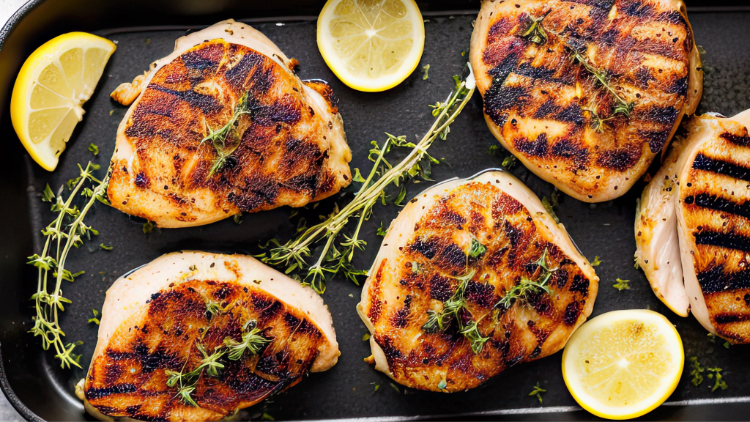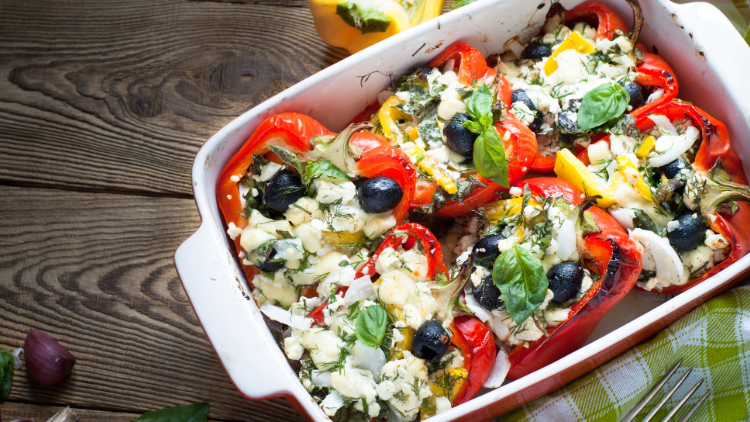Welcome



Are you ready to delight your palate while nourishing your body? The Mediterranean diet is renowned for its vibrant flavors and numerous health benefits, making it a favorite for food lovers and health enthusiasts alike. With its focus on fresh vegetables, wholesome grains, healthy fats, and lean proteins, this culinary lifestyle not only supports weight management but also promotes heart health and longevity.
In this article, we’ll explore 10 delicious Mediterranean diet meals that are sure to enhance both your health and taste buds. From zesty tabbouleh to savory Mediterranean grilled chicken, each recipe is a celebration of the rich, diverse ingredients that define this vibrant cuisine. So, whether you're a longtime fan of Mediterranean flavors or a curious newcomer, prepare to savor these delectable dishes that nourish your body and soul, one delicious bite at a time!

The Mediterranean diet is often lauded for its impressive array of health benefits, making it a popular choice among nutritionists and health-conscious individuals. One of the primary advantages is its positive impact on heart health. Rich in healthy fats, such as those found in olive oil, nuts, and fatty fish, this diet helps to reduce bad cholesterol levels while promoting good cholesterol. These healthy fats aid in maintaining flexible and healthy blood vessels, reducing the risk of heart attacks and strokes. Additionally, the inclusion of a variety of fruits and vegetables provides essential vitamins, minerals, and antioxidants that support overall cardiovascular health.
Another significant benefit of the Mediterranean diet is its role in weight management and diabetes prevention. Unlike restrictive diets, the Mediterranean approach emphasizes balanced, wholesome eating without strict calorie counting. This makes it sustainable and enjoyable for individuals. The diet's focus on whole grains and fiber-rich foods aids in regulating blood sugar levels and preventing insulin resistance, which is crucial for managing and preventing type 2 diabetes. Furthermore, the high fiber content helps to keep you feeling full longer, reducing overeating and aiding in weight loss or maintenance.
Beyond physical health, the Mediterranean diet also supports mental well-being. Studies have shown that diets rich in fruits, vegetables, and fish are associated with a lower risk of depression and cognitive decline. The anti-inflammatory properties of the foods consumed in this diet, along with the presence of omega-3 fatty acids from fish, contribute to better brain health. By adopting the Mediterranean diet, individuals can enjoy a delicious and varied culinary experience while reaping the numerous benefits for both body and mind.
Mediterranean cuisine is characterized by its use of fresh, seasonal ingredients that are both flavorful and nutritious. Olive oil is a staple, often used as the primary cooking fat and dressing, providing a rich source of monounsaturated fats and antioxidants. This golden elixir not only enhances the taste of dishes but also offers numerous health benefits, such as reducing inflammation and improving heart health. Another cornerstone of this cuisine is an abundance of vegetables, including tomatoes, cucumbers, eggplants, and leafy greens, which provide essential vitamins, minerals, and fiber.
Whole grains play a significant role in Mediterranean meals, with options like bulgur, farro, barley, and whole wheat being common. These grains are nutrient-dense, offering complex carbohydrates, fiber, and various vitamins that support sustained energy levels and digestive health. Legumes, such as chickpeas, lentils, and beans, are also integral to the diet, providing plant-based protein and additional fiber. These ingredients create hearty and satisfying dishes that are both nutritious and delicious.
Lean proteins, particularly fish and poultry, are frequently featured in Mediterranean cuisine. Fish, especially fatty varieties like salmon, mackerel, and sardines, are rich in omega-3 fatty acids, which are beneficial for heart and brain health. Poultry provides a lean source of protein without the high levels of saturated fats found in red meat. Additionally, dairy products such as yogurt and cheese, consumed in moderation, contribute calcium and probiotics for gut health. Herbs and spices, including oregano, basil, rosemary, and garlic, are used generously to infuse dishes with vibrant flavors while offering their own health benefits.
Quinoa tabbouleh salad is a refreshing and nutrient-packed dish that exemplifies the best of Mediterranean cuisine. This modern twist on the traditional bulgur-based tabbouleh uses quinoa, a protein-rich grain, as its base. Quinoa is not only gluten-free but also provides all nine essential amino acids, making it a complete protein source. This makes the salad a perfect choice for vegetarians and those looking to increase their protein intake without consuming meat.
The salad is a vibrant medley of fresh ingredients, including finely chopped parsley, mint, tomatoes, cucumbers, and red onions. These vegetables and herbs are rich in vitamins, minerals, and antioxidants, which contribute to overall health and help reduce inflammation. The addition of lemon juice and olive oil not only enhances the flavor but also provides healthy fats and vitamin C, which support immune function and skin health. This combination of ingredients makes the quinoa tabbouleh salad both delicious and highly nutritious.
Preparation is straightforward and quick, making it an ideal option for busy individuals or meal prep enthusiasts. To make the salad, cook the quinoa according to package instructions and let it cool. Meanwhile, chop the vegetables and herbs finely. In a large bowl, combine the quinoa with the chopped vegetables and herbs, then drizzle with olive oil and lemon juice. Season with salt and pepper to taste. The result is a light, refreshing salad that can be enjoyed on its own or as a side dish. It's perfect for a healthy lunch, a picnic, or a light dinner.

Grilled lemon herb chicken is a simple yet flavorful dish that highlights the fresh, aromatic qualities of Mediterranean cuisine. This meal features chicken breasts marinated in a zesty blend of lemon juice, olive oil, garlic, and a mix of herbs such as thyme, rosemary, and oregano. The marinade not only infuses the chicken with vibrant flavors but also helps to tenderize the meat, ensuring a juicy and succulent result. This dish is a great source of lean protein, which is essential for muscle repair and overall health.
The preparation process is straightforward, making it a perfect option for weeknight dinners or casual gatherings. To prepare the marinade, whisk together lemon juice, olive oil, minced garlic, and chopped herbs in a bowl. Place the chicken breasts in a resealable bag or a shallow dish, pour the marinade over them, and let them marinate in the refrigerator for at least 30 minutes or up to 2 hours for the best flavor. Once marinated, grill the chicken over medium-high heat until fully cooked, about 6-7 minutes per side, depending on the thickness of the breasts.
Grilled lemon herb chicken pairs well with a variety of side dishes, making it a versatile addition to any meal plan. Serve it alongside a fresh Greek salad, roasted vegetables, or a simple quinoa pilaf for a balanced and satisfying meal. The bright, citrusy flavor of the lemon and the aromatic herbs complement the natural taste of the chicken, creating a dish that is both nutritious and delicious. This meal is sure to become a favorite in your Mediterranean diet repertoire.
Mediterranean chickpea stew is a hearty and comforting dish that showcases the richness and diversity of flavors in Mediterranean cuisine. This plant-based stew is packed with nutrient-dense ingredients, including chickpeas, tomatoes, spinach, and bell peppers, making it a wholesome and satisfying meal. Chickpeas are an excellent source of plant-based protein and fiber, which help to keep you full and support digestive health. The combination of vegetables provides a variety of vitamins, minerals, and antioxidants that promote overall well-being.
The stew is seasoned with a blend of Mediterranean spices, such as cumin, paprika, and coriander, which add depth and warmth to the dish. Garlic and onions are sautéed at the beginning of the cooking process, releasing their aromatic flavors and forming the base of the stew. The addition of vegetable broth and crushed tomatoes creates a rich and flavorful sauce that ties all the ingredients together. This stew is not only delicious but also easy to prepare, making it an ideal option for busy weeknights.
To make the Mediterranean chickpea stew, start by heating olive oil in a large pot over medium heat. Add chopped onions and garlic, and sauté until softened and fragrant. Stir in the spices and cook for another minute to toast them. Add diced bell peppers, crushed tomatoes, vegetable broth, and drained chickpeas, and bring the mixture to a simmer. Let it cook for about 20-30 minutes until the flavors meld together. Stir in fresh spinach just before serving, allowing it to wilt in the hot stew. Garnish with fresh herbs and a squeeze of lemon juice for an added burst of flavor. Enjoy this stew on its own, or serve it over a bed of whole grains for a complete and nourishing meal.
Baked salmon with olives and tomatoes is a delightful and nutritious dish that captures the essence of Mediterranean flavors. This meal features salmon fillets baked with a medley of cherry tomatoes, Kalamata olives, garlic, and fresh herbs. Salmon is an excellent source of omega-3 fatty acids, which are essential for heart and brain health. The combination of tomatoes and olives adds a burst of flavor and provides additional nutrients, such as vitamins A and C, as well as healthy fats from the olives.
The preparation of this dish is simple and requires minimal effort, making it perfect for both weeknight dinners and special occasions. To start, preheat the oven to 400°F (200°C) and line a baking sheet with parchment paper. Arrange the salmon fillets on the baking sheet and season them with salt, pepper, and a drizzle of olive oil. In a bowl, toss halved cherry tomatoes, pitted Kalamata olives, minced garlic, and chopped fresh herbs such as basil and oregano with a bit of olive oil. Spread the tomato and olive mixture around the salmon fillets, ensuring they are evenly distributed.
Bake the salmon in the preheated oven for about 15-20 minutes, or until the fish is cooked through and flakes easily with a fork. The tomatoes will soften and release their juices, creating a flavorful sauce that complements the richness of the salmon. Serve the baked salmon with a side of steamed vegetables or a simple green salad for a balanced and satisfying meal. This dish not only tastes amazing but also provides a wealth of nutrients that support overall health and well-being.

Spinach and feta stuffed peppers are a delicious and visually appealing dish that highlights the vibrant colors and flavors of Mediterranean cuisine. This meal features bell peppers filled with a savory mixture of spinach, feta cheese, quinoa, and aromatic herbs. Bell peppers are rich in vitamins A and C, which support immune function and skin health. The addition of spinach provides a boost of iron and other essential nutrients, while feta cheese adds a tangy and creamy element to the dish.
Preparing stuffed peppers is relatively easy and can be done in advance, making it a convenient option for meal prep or entertaining guests. To begin, preheat the oven to 375°F (190°C) and prepare the bell peppers by cutting off the tops and removing the seeds and membranes. In a skillet, sauté chopped onions and garlic in olive oil until softened. Add fresh spinach and cook until wilted. Transfer the spinach mixture to a bowl and stir in cooked quinoa, crumbled feta cheese, and chopped fresh herbs such as parsley and dill. Season with salt and pepper to taste.
Stuff the prepared bell peppers with the spinach and feta mixture, pressing down gently to ensure they are evenly filled. Arrange the stuffed peppers in a baking dish and drizzle with a bit of olive oil. Cover the dish with foil and bake for about 30-35 minutes, or until the peppers are tender. Remove the foil and bake for an additional 10 minutes to allow the tops to brown slightly. Serve the stuffed peppers with a side of Greek yogurt or a simple cucumber salad for a complete and satisfying meal. This dish is sure to impress with its vibrant colors and delicious flavors.
Whole wheat pita with hummus and veggies is a simple yet delicious meal that embodies the essence of Mediterranean eating. This dish features soft and chewy whole wheat pita bread served with creamy hummus and an array of fresh vegetables. Whole wheat pita provides a good source of complex carbohydrates and fiber, which help to keep you full and provide sustained energy. Hummus, made from chickpeas, tahini, lemon juice, and garlic, is rich in plant-based protein and healthy fats, making it a nutritious and satisfying spread.
This meal is highly versatile and can be customized with your favorite vegetables and toppings. Some popular options include sliced cucumbers, cherry tomatoes, bell peppers, radishes, and red onions. These vegetables add a refreshing crunch and a variety of vitamins and minerals to the meal. You can also add additional toppings such as olives, feta cheese, or a sprinkle of za'atar spice for extra flavor. This combination of ingredients makes for a well-rounded and balanced meal that is both delicious and nutritious.
To prepare, simply warm the whole wheat pita bread in the oven or on a stovetop until soft and pliable. Spread a generous layer of hummus on each pita and top with your choice of sliced vegetables and toppings. For added convenience, you can also serve the hummus and veggies as a platter with pita bread on the side, allowing everyone to assemble their own pitas. This meal is perfect for a quick lunch, a light dinner, or as a healthy snack. It's a great way to enjoy the fresh and vibrant flavors of Mediterranean cuisine in a simple and convenient format.
Embracing the Mediterranean lifestyle goes beyond just enjoying its delicious and nutritious meals. It involves adopting a holistic approach to health and well-being that includes regular physical activity, social connections, and mindful eating. The Mediterranean diet encourages the consumption of whole, minimally processed foods that are rich in nutrients and flavor. By incorporating more fruits, vegetables, whole grains, healthy fats, and lean proteins into your diet, you can experience numerous health benefits, including improved heart health, better weight management, and enhanced mental well-being.
In addition to the dietary aspect, the Mediterranean lifestyle emphasizes the importance of physical activity and spending time with loved ones. Regular exercise, such as walking, swimming, or cycling, is a key component of maintaining overall health and vitality. Social interactions and sharing meals with family and friends also play a crucial role in promoting a sense of community and emotional well-being. By adopting these principles, you can create a balanced and fulfilling lifestyle that supports both your physical and mental health.
Whether you are a longtime fan of Mediterranean flavors or a curious newcomer, the recipes and meals presented in this article offer a delicious and accessible way to incorporate this healthy eating pattern into your daily routine. From the refreshing quinoa tabbouleh salad to the comforting Mediterranean chickpea stew, each dish is a celebration of the rich and diverse ingredients that define this vibrant cuisine. By savoring these delectable meals, you can nourish your body and soul, one delicious bite at a time. Embrace the Mediterranean lifestyle and enjoy the journey to better health and happiness.